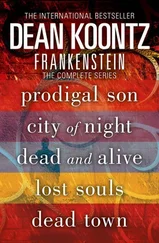Saturday morning, Paul made himself useful by assisting Grace with food preparation and by setting out the plates, flatware, and glasses on the dining-room sideboard.
He was in the kitchen at 11:20, spreading frosting on a large chocolate sheet cake while the reverend expertly frosted a coconut-layer job.
Grace, having just finished washing a sinkful of dishes, stood monitoring the application of the icing and drying her hands, when the telephone rang. She picked it up, and as she said, “Hello,” the front of the house exploded.
A great boom. Concussion rocked the floor and shuddered the walls and made the roof timbers squeal as though unsuspected colonies of bats had taken flight by the thousands all in the same instant.
Grace dropped the phone. Harrison let the frosting knife slip out of his fingers.
Through the cacophony of shattering glass, splintering wood, and cracking plaster, Paul heard the hard roar of an engine, the blare of a horn, and suspected what must have happened. Some drunk or reckless driver had crashed at high speed into the parsonage.
Having arrived at this same astonishing but nonetheless obvious conclusion, Harrison said, “Someone has to've been hurt.” He hurried out of the kitchen, through the dining room, with Paul close behind him.
In the front wall of the living room, where once had been a fine bay window, the parsonage lay open to the sunny day. Tom shrubbery, carried in from outside, marked the path of destruction. In the very middle of the room, plowed against a toppled sofa and a thick drift of broken furniture, a battered red Pontiac sagged to the left on broken springs and blown tires. A portion of the crazed windshield quivered and collapsed inward, while plumes of steam hissed from under the buckled hood.
Though they had expected the cause of the explosion, both Paul and Harrison were halted by shock at the sight of all this ruination. They had expected to find the car jammed into the wall of the house, never this far inside. The speed required to penetrate this distance into the structure beggared Paul's skills of calculation and made him wonder if even recklessness and alcohol were sufficient to produce, such a catastrophe.
The driver's door opened, shoving aside a damaged tea table, and a man climbed out of the Pontiac.
Two things about him were remarkable, beginning with his face. His head was wrapped with white gauze bandages, so he looked like Claude Rains in The Invisible Man or like Humphrey Bogart in that movie about the escaped convict who has plastic surgery to foil the police and to start a new life with Lauren Bacall. Blond hair sprouted from the top of the elaborate wrappings. Otherwise, only his eyes, his nostrils, and his lips were uncovered.
The second remarkable thing was the gun in his hand.
The sight of the heavily bandaged face apparently pressed all of the compassion buttons in the reverend, because he broke out of his paralytic shock and started forward-before he registered the weapon.
For a driver who had just engaged in a demolition derby with a house, the mummified man was steady on his feet and unhesitant in his actions. He turned to Harrison White and shot him twice in the chest.
Paul didn't realize that Grace had followed them into the living room until she screamed. She started to push past him, heading toward her husband even as Harrison went down.
Holding the pistol, fully extending his right arm in execution style, the gunman approached the fallen minister.
Grace White was petite, and Paul wasn't. Otherwise he might not have been able to halt her determined rush toward her husband, might not have been able to scoop her off her feet and, carrying her in his arms, spirit her to safety.
The parsonage was a clean, respectable, and even charming house, but nothing about it might be called grand. No sweeping staircase offered a glamorous showcase adequate for Scarlett O'Hara. Instead, the stairs were enclosed, accessed by a door in one comer of the living room.
Paul was nearest to that corner when he halted Grace in her rush toward certain death. Before he quite realized what he was doing, he found that he'd flung open the door and climbed half the single long flight of steps, as surefooted as Doc Savage or the Saint, or the Whistler, or any of the other pulp-fiction heroes whose exploits had for so long been his adventures by proxy.
Behind them, two shots roared, and Paul knew that the reverend was no longer of this world.
Grace knew it, too, because she went limp with misery in his arms, ceased struggling against him.
Yet when he put her down in the upstairs hall, she cried out for her husband—“Harry!"
” — and tried to plunge once more into the narrow stairwell.
Paul pulled her back. He gently but firmly thrust her through the open door of the guest room in which he'd spent the night. “Stay here, wait."
At the foot of the bed: a cedar chest. Four feet long, two feet wide, perhaps three high. Brass handles.
Judging by Grace's expression when Paul plucked the chest off the floor, he figured it was heavy. He had no way of knowing for sure, because he was in a weird state, so saturated with adrenaline that his heart squirted blood through his arteries at a speed Zeus couldn't have matched with the fastest lightning bolts in his quiver. The chest felt no heavier than a pillow, which couldn't be right, even if it was empty.
With no clear awareness of having left the guest room, Paul looked down the enclosed stairs.
The bandaged man stormed up from the ruin of the living room, gauze fluttering around his lips as his hard exhalations seemed to prove that he wasn't a long-dead pharaoh reanimated to punish some heedless archaeologist who had ignored all warnings and violated his tomb. So this wasn't a Weird Tales moment.
Paul pitched the chest into the stairwell.
A gunshot. Cedar shrapnel.
With a bark of pain, chest to chest with defeat, the killer was borne downward by the fragrant weight, in a clink and clatter of brass handles.
Paul in the guest room again. Sweeping a bedside lamp to the floor, lifting the nightstand.
Then once more at the head of the stairs.
At the bottom, the killer had pushed the cedar chest aside and clambered to his feet. From out of his raveled Tutankhamen windings, he peered up at Paul and fired one shot without taking aim, almost halfheartedly, before disappearing into the living room.
Paul set the nightstand down but waited, ready to shove the furniture into the stairwell if the swaddled gunman dared return.
Downstairs, two shots cracked, and an instant after the second, an explosion shook the parsonage as though the long-promised Judgment were at hand. This was a real explosion, not the impact of another runaway Pontiac.
Orange firelight bloomed in the living room below, a wave of heat washed over Paul, and immediately behind the heat came greasy masses of roiling black smoke, drawn to the stairwell as to a flue.
The guest room. Bring Grace to the window. Disengage the latch. No good. Warped or painted shut. Small panes, sturdy mullions too difficult to break out.
“Hold your breath and hurry,” he urged, drawing her with him into the hall.
Choking fumes, blinding soot. A licking heat told him that slithering fire had followed the smoke up the stairs and now coiled perilously close in the murk.
Toward the front of the house, along a hallway suddenly as dark as a tunnel, toward a vague light in the seething gloom. And here a window at the end of the hall.
This one slid easily up. Fresh cold air, welcome daylight.
Outside, flames churned to the left and right of the opening. The front of the house was afire.
No turning back. In the fuming blackness, they would become disoriented in seconds, fall, and suffocate as surely as they would burn. Besides, the open window, providing draft, would draw the fire rapidly down the hallway at their backs.
Читать дальше











